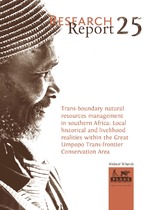Trans-boundary natural resources management in southern Africa: Local historical and livelihood realities within the Great Limpopo Trans-frontier Conservation Area
Abstract
The end of apartheid rule in South Africa, together with the termination of the civil war in Mozambique and the occupation of Namibia by South Africa in the early 1990s, seemed to herald profound changes in international relations within the southern African region. These changes saw not only the end of frontline states’ hostility towards the apartheid regime but also new approaches to co-operation, witnessed by increased focus on regional development issues through regional bodies such as the Southern African Development Community (SADC). Conservation emerged as one area that could foster co-operation between countries of the region. By the mid-1990s, trans-boundary natural resources management, trans-frontier conservation, trans-boundary protected areas and ‘peace parks’ had taken root as vehicles for regional economic integration, peaceful resolution of conflict and conservation of biodiversity.
This report examines the impacts of local historical experiences with conservation and current livelihood complexities on efforts to implement the Great Limpopo Trans-frontier Park (GLTP) and the Great Limpopo Trans-frontier Conservation Area (GLTFCA). It stresses the contested nature of land and natural resource rights by exploring local conflicts over land use, authority and territorial boundaries, as well as the peripheral attention accorded to these issues in planning and implementing trans-boundary approaches to conservation. Using the example of the GLTFCA, specifically the experience of some of the villages along the Madimbo corridor in South Africa, the report highlights the complexities involved in attempting trans-frontier conservation in an area with a history of dispossession and where livelihoods are perceived to be threatened by outside interventions. The report concludes by proposing a human and environmental security approach towards implementing TFCAs.

